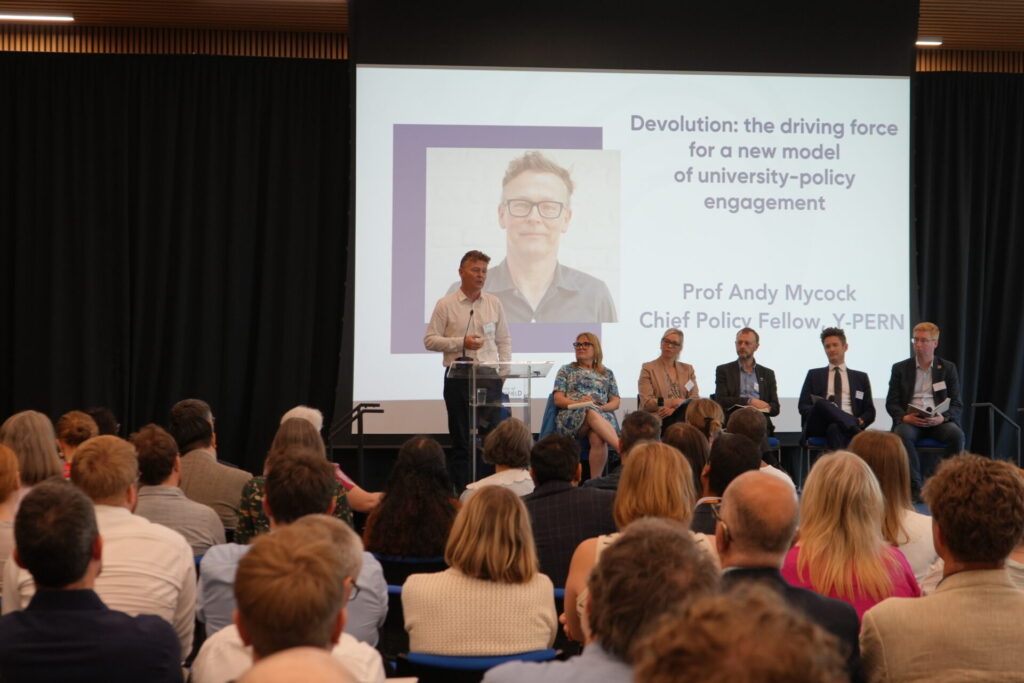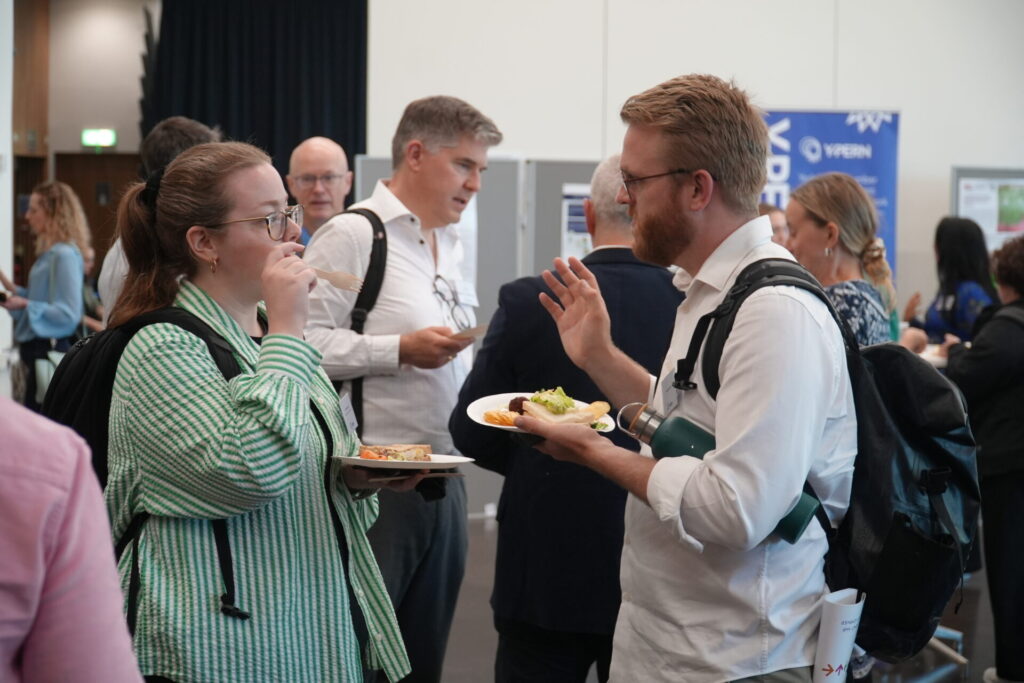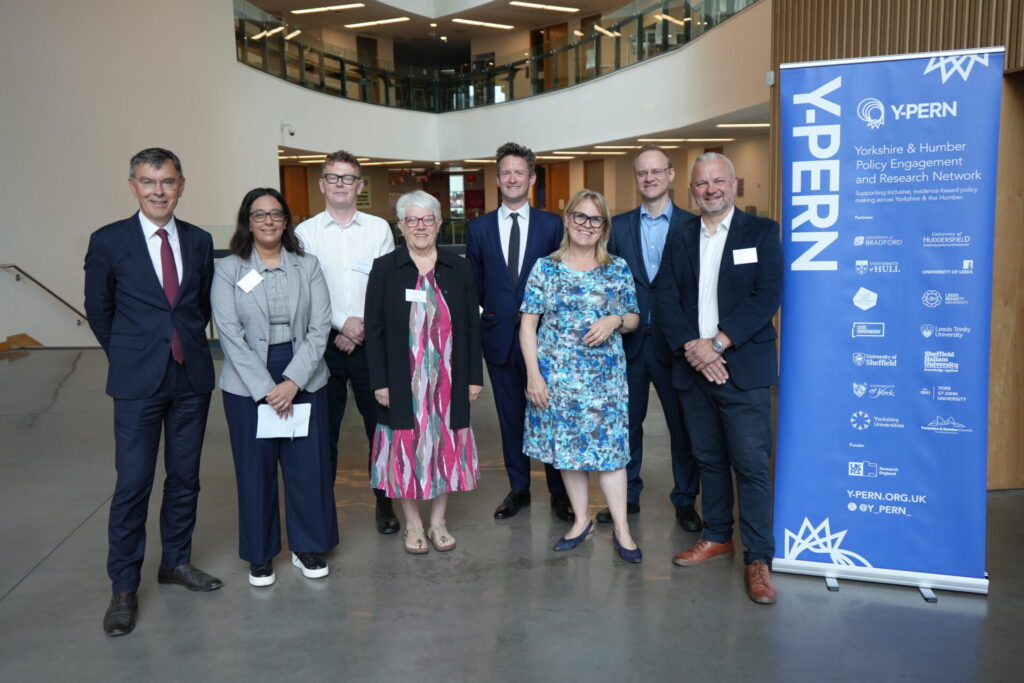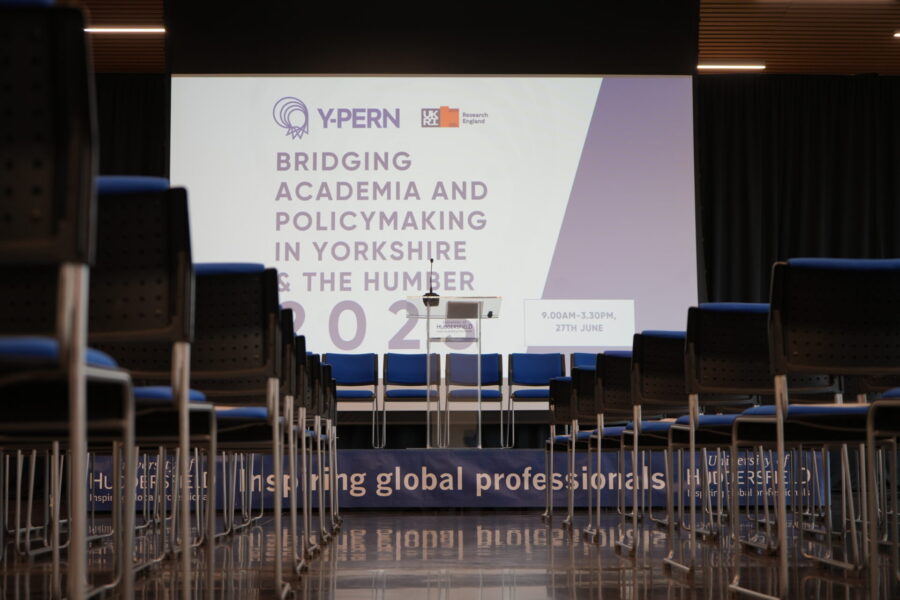This blog was written by Chris Hewson and was originally published on his personal LinkedIn blog on 5/7/2025. Chris is Head of Policy Engagement at the University of Huddersfield. The Y-PERN conference took place in Huddersfield on 27th June 2025.
The Y-PERN conference takes place at a pivotal moment, with the so-called ‘devolution revolution’ beginning to take tangible shape. As Andy Mycock, Y-PERN’s Chief Policy Fellow underlined, the strategic early adoption of a network model has successfully positioned Y-PERN to capitalise on opportunities presented to Yorkshire Universities members, and serves as a practical model for other regions. Over three years, Y-PERN has supported a diverse array of policy projects in the region requiring evidence and capacity and has fostered relationships that align with broader Higher Education (HE) efforts to build trust within communities and in/within regional governance structures, particularly Combined/Mayoral Authorities.
Whilst decentralised governance is commonplace internationally, one panellist pointedly observed that all too often our higher education institutions are behind the curve – perceived as the ‘University of X’, rather than ‘University for X’. This is nevertheless a journey, and it is significant that one role of initiatives like Y-PERN is to foster honest reflection, as the voyage progresses towards a largely indeterminate destination. Similarly, as the UK Government has changed and approaches to devolution have evolved, across the HE and local government sectors there is now a more nuanced understanding of shared potential, our capabilities, and our limitations. With this context in mind, I offer five sets of reflections drawn from the conference.
1. There is much to be optimistic about regarding regional development and innovation.
Initiatives, such as the West Yorkshire Health Innovation and Digital Technology Investment Zone, show the value of universities and the wider research and development sector for our towns and cities. When good working relationships are formed, universities can make better strategic decisions around specialisation, and citizens can comprehend a sense of growth, renewal and opportunity. Furthermore, as Harpreet Uppal (Member of Parliament for Huddersfield) noted, the inherent relationship between innovation and resilience has significant knock-on effects with respect to urban regeneration, and how citizens perceive the vitality of their towns and cities. In this regard it is evident that the Government has serious intentions, with both Harpreet and the Mayor of West Yorkshire Tracy Brabin, noting the role of the British Business Bank, new Research and Development (R&D) funding, and the refrain that communities need to work together to achieve economic growth. These themes were echoed throughout the day, albeit with two notes of caution. As one contributor observed, “we can only move forward if we know what the issues are… complexity exists, we don’t need to be scared of it”. Another participant quoted William Gibson’s famous axiom, “the future is already here, it’s just not equally distributed.” Put simply, we must support access to better and more diverse forms of evidence and promote a more inclusive vision of how the benefits of research and innovation can be equally distributed.

2. A critical challenge remains; public consent has not yet been firmly established.
It was clear that whilst we are doing many of the right things, how we communicate and ‘open up’ these activities regularly leaves much to be desired. As one panellist remarked “universities are a bit rubbish at engaging with people who don’t traditionally engage with them,” often running scared of community backlash rather than engaging with humility and respect. This is tough, as the activities that are required to generate and uphold public consent often fall between the cracks of individual and institutional responsibility. Whilst regions now have a more of a ‘say’ in economic development, and an active role in developing investment and growth strategies, citizens are often left wondering what this means in practice. As one contributor reminded us “it’s not about how we’ve done things previously.” As co-stewards of our towns and cities, regional government and universities must develop new forms of engagement, with the Sheffield Policy Campus, home to the Government’s ‘Opportunity Mission’, provided as one example of successfully bringing these two worlds together.
There is still a feeling from some individuals and groups that they are not being listened to. Developing co-produced Areas of Research Interest (ARIs) can be seen as part of the answer, as are other forms of capacity building that bring diverse groups of stakeholders together across traditional divides, in non-instrumental ways. Whatever the models chosen, it was clear that for research funders it is essential to obtain a more fine-grained sense of which forms and modes of research are important at the local level. This supports a clearer vision of which research areas to prioritise and ultimately leads to better funding decisions.
Stian Westlake, Executive Chair of the Economic and Social Research Council (ESRC), reiterated this argument – that local convening, bringing different groups together around shared purpose, has inherent benefits, creating the conditions and structures for future investment (e.g. the Local Innovation Partnership Fund), and is consistent with allied moves towards making R&D decisions on the ground ‘where the knowledge exists’ (e.g. with respect to the R&D Missions Programme). More pragmatically, models of co-funding are viewed as a ‘practical manifestation of shared purpose’, with cross-sectoral working being more effective if everyone has ‘skin in the game’.
3. The implications of devolution for the university sector are multifaceted and profound.
“Ignoring place is morally the wrong thing to do”, noted the Chief Executive of Yorkshire Universities, Peter O’Brien, and as Bec Riley, Director of City-REDI later remarked, “if you do not have different models emerging in different places, what you are doing could not be said to be place-based.” Place is both important, and inherently resistant to standardised solutions. Given that mayoral regions are now viable entities that can lobby for new powers, a key role emerges for universities in supporting a diverse and entrepreneurial ecosystem. As the argument goes, with regional approaches diverging, a difference in approach from the HE providers in these regions (from each other, and from comparator institutions across the UK) should naturally follow. This is consistent with recent comments from UKRI on the role of universities in “bringing unique capacities and capabilities to bear”. It will be interesting to see where we arrive at in relation to this trajectory in five years’ time.

The message, loud and clear, was that the creation of new forms of organisation, institutional structures, and capabilities, is vital to generate the ‘credibility in delivery’ that subsequently leads to a greater ability and appetite to take on and deliver more ‘radical’ solutions to intractable local and regional problems. We must walk before we can run. I also thought that some particularly constructive points were made in terms of the inherent value of ‘the local’; that regional governance cannot simply ‘suck up local initiatives into the regional scale’, with one local authority representative rightly arguing that we cannot view Mayoral Strategic Authorities (MSAs) as the ‘strategic head’, with local authorities as the ‘doers’.
Another panellist reflected that at the sub-national level policymaking is about “working out how to interpret moving parts nationally and translating this into the language of local issues and needs.” The key starting point being “to get people round the table to have light and heavy conversations.” This speaks to the need for more robust convening structures to support multi-level policymaking, something that the HE sector can and should help to deliver.
It was encouraging that whilst the focus of the day was on research and evidence uptake, the student body as a regional resource was discussed more than once, albeit in the context of the ongoing disconnect between teaching, research and what might loosely be termed ‘corporate engagement’ from universities. The key point was that there is a danger of replicating national skills priorities locally, when rather the skills mix must be seen to cohere with regional R&D priorities.
4. In this evolving landscape, we must reconsider the nature and role of research itself.
Responsiveness was a watchword throughout the conference, with the value of local observatories, networks and infrastructures highlighted, with local policymakers constantly challenged by the need to understand what is happening, in real time, within their localities. Leaving aside the Government’s missions, there was as strong belief in the room that research should always be ‘mission-led’, but this does not mean that it should not be driven by curiosity. The key danger is that we end up as ‘busy fools’, ploughing existing furrows, and sidestepping important questions such as ‘what does success look like here and now?’ and ‘what is the appropriate scale for this proposed intervention?’
Useful insights emerged from these observations. Firstly, action learning that addresses real world problems is vital. Secondly, there is no point proposing solutions that are too complex to initiate or operationalise. Thirdly, a networked approach to policy engagement supports policy entities in convening the best selection of expertise to undertake the work required. Fourthly, ongoing evaluation and ‘fast failure’ models can give us a better and quicker sense of what’s working well and obviate ‘the perfect from becoming the enemy of the good.’ Finally, moving away from extractive approaches to citizen engagement and consultation might usefully utilise HE expertise around (largely qualitative) methods and models for handling complexity, resistance, and uncertainty.

5. Mobility – both conceptual and professional – is essential to fostering collaboration and understanding.
There’s no substitute for seeing the world through someone else’s eyes. Throughout the day we were presented with examples of secondments from across Y-PERN, alongside instances of specific expertise being enmeshed into the work of Combined Authorities. There was a pragmatic point here, in that subsidised academic secondments were of clear benefit to a public sector that has been stripped of analytic capacity. Three other observations are also pertinent. Firstly, secondments are often too short, with missed opportunities to properly integrate at the organisational level. Secondly, there are benefits to promoting more ongoing two-way mobility, alongside mobility between different levels of Government. Thirdly, there is a wider question about how the university sector supports the policy profession across local government that goes beyond secondments and includes the mobility of ‘ideas and approaches.’ There are, of course, a range of different models, promoted by UKRI investments such as the Universities Policy Engagement Network (UPEN), Capabilities in Academic Policy Engagement (CAPE) and the Local Policy innovation Partnership Hub (LPIP Hub), as well as attempts to integrate these with the question of how you bring community stakeholders into the policy process in more formal (i.e. not simply consultative) ways. Good examples are provided by the UKRI Community Research Network Programme, and the Yorkshire Policy Innovation Partnership (YPIP), where universities are positioned as partners, rather than leaders.
6. Overall, the discussions underscored several key themes and actionable insights.
A clear takeaway from the day was that the regional evidence-to-policy ecosystem is variable across the UK, but you can’t undertake this work strategically without some form of collective network approach. Single institution models, particularly in the context of the higher education funding crisis, are increasingly inefficient for all parties. Moreover, possessing the tools and capacity to engage more deeply within localities leads to a greater diversity of evidence, increased community consent, and potentially better decision making and policy outcomes.
At the outset of the day, it was noted that the lack of funding for both universities and local authorities had routinely encouraged a safety-first approach, a reversion to the status quo, and inertia. To transform this, we require strong leadership at all levels, as well as a funding system that can feed back priorities into coherent programmes and encourage universities to behave in a more demand-driven way. We’re perhaps part of the way there.
Taken as a whole, this is no easy task. Yet, as one participant remarked, this debate is not really about policy or policymaking at all; decisions will always get made in one form or another, the issue therefore is about taking a wider, aligned, transdisciplinary, and more inclusive approach to research and practice in all its forms. This requires universities to become more porous (e.g. formed of programmes, activities, and other ‘building blocks’ that make sense to those outside the sector), and to learn from best practice from wherever it emerges, even internationally. As one panellist reflected, the debate has now moved on from the paradigm of how we must make it easier for universities to talk to policymakers, towards a consideration of how together we convene multiple stakeholders across places, as a precursor to making those places better for everyone.
Y-PERN would like to thank Chris for sharing his insights.



